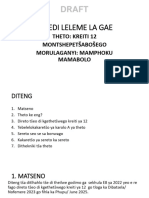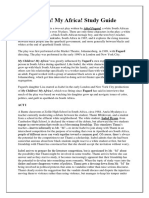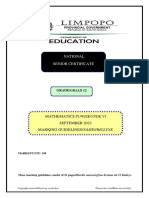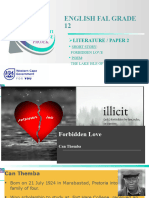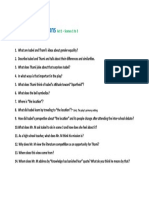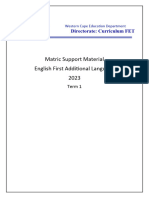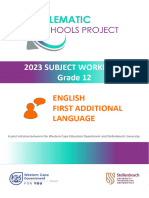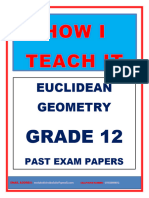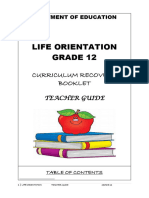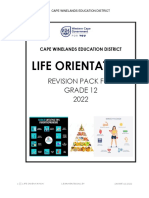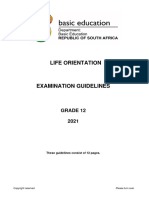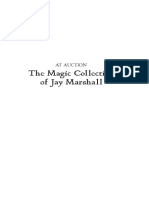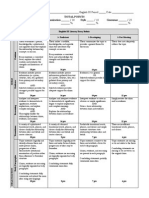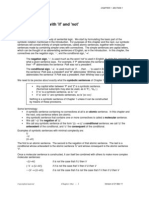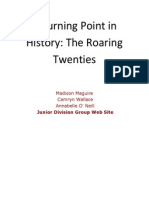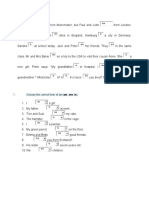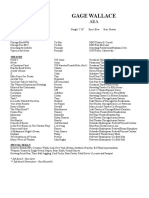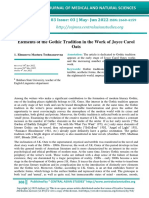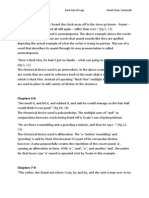Professional Documents
Culture Documents
English FAL P2 Nov 2022
English FAL P2 Nov 2022
Uploaded by
Likhona MuziCopyright
Available Formats
Share this document
Did you find this document useful?
Is this content inappropriate?
Report this DocumentCopyright:
Available Formats
English FAL P2 Nov 2022
English FAL P2 Nov 2022
Uploaded by
Likhona MuziCopyright:
Available Formats
NATIONAL
SENIOR CERTIFICATE
GRADE 12
ENGLISH FIRST ADDITIONAL LANGUAGE P2
NOVEMBER 2022
MARKS: 70
TIME: 2½ hours
This question paper consists of 28 pages.
Copyright reserved Please turn over
English First Additional Language/P2 2 DBE/November 2022
NSC
INSTRUCTIONS AND INFORMATION
Read these instructions carefully before you begin to answer the questions.
1. Do NOT attempt to read the entire question paper. Consult the TABLE OF
CONTENTS on the next page and mark the numbers of the questions set on
the texts you have studied this year. Read these questions carefully and
answer as per the instructions.
2. This question paper consists of FOUR sections:
SECTION A: Novel (35)
SECTION B: Drama (35)
SECTION C: Short stories (35)
SECTION D: Poetry (35)
3. Answer TWO QUESTIONS in all, ONE question each from ANY TWO
sections.
SECTION A: NOVEL
Answer the question on the novel you have studied.
SECTION B: DRAMA
Answer the question on the drama you have studied.
SECTION C: SHORT STORIES
Answer the questions set on BOTH short stories.
SECTION D: POETRY
Answer the questions set on BOTH poems.
4. Use the checklist on page 4 to assist you.
5. Follow the instructions at the beginning of each section carefully.
6. Number the answers correctly according to the numbering system used in this
question paper.
7. Start EACH section on a NEW page.
8. Suggested time management: Spend approximately 75 minutes on each
section.
9. Write neatly and legibly.
Copyright reserved Please turn over
English First Additional Language/P2 3 DBE/November 2022
NSC
TABLE OF CONTENTS
SECTION A: NOVEL
Answer ANY ONE question.
QUESTION NO. MARKS PAGE NO.
1. Cry, the Beloved Country 35 5
2. Strange Case of Dr Jekyll and Mr Hyde 35 9
SECTION B: DRAMA
Answer ANY ONE question.
3. Macbeth 35 13
4. My Children! My Africa! 35 18
SECTION C: SHORT STORIES
Answer the questions set on BOTH extracts.
5.1 'The new tribe' 17 21
AND
5.2 'The fur coat' 18 23
SECTION D: POETRY
Answer the questions set on BOTH poems.
6.1 'Captive' 17 25
AND
6.2 'Mid-term break' 18 27
Copyright reserved Please turn over
English First Additional Language/P2 4 DBE/November 2022
NSC
CHECKLIST
NOTE:
Answer questions from ANY TWO sections.
Tick () the sections you have answered.
SECTIONS QUESTION NO. OF TICK
NUMBERS QUESTIONS TO ()
ANSWER
A: Novel 1–2 1
B: Drama 3–4 1
C: Short stories 5 1
D: Poetry 6 1
NOTE: Ensure that you have answered questions on TWO sections only.
Copyright reserved Please turn over
English First Additional Language/P2 5 DBE/November 2022
NSC
SECTION A: NOVEL
In this section, questions are set on the following novels:
CRY, THE BELOVED COUNTRY by Alan Paton
STRANGE CASE OF DR JEKYLL AND MR HYDE by Robert Louis Stevenson
Answer ALL the questions on the novel that you have studied.
QUESTION 1: CRY, THE BELOVED COUNTRY
Read the extracts from the novel below and answer the questions set on each. The
number of marks allocated to each question serves as a guide to the expected length
of your answer.
NOTE: Answer the questions set on BOTH extracts, i.e. QUESTION 1.1 AND
QUESTION 1.2.
1.1 EXTRACT A
[Stephen Kumalo is at Mission House.]
You must think I am thoughtless. But you will pardon me if I ask you first,
why did she come to Johannesburg?
Kumalo, though disturbed by this question, answered obediently. She
came to look for her husband who was recruited for the mines. But when his
time was up, he did not return, nor did he write at all. She did not know if he 5
were dead perhaps. So she took her small child and went to look for him.
Then because Msimangu did not speak, he asked anxiously, Is she
very sick?
Msimangu said gravely, Yes, she is very sick. But it is not that kind of
sickness. It is another, a worse kind of sickness. I sent for you firstly because 10
she is a woman that is alone, and secondly because her brother is a priest.
I do not know if she ever found her husband, but she has no husband now.
He looked at Kumalo. It would be truer to say, he said, that she has many
husbands.
Kumalo said, Tixo! Tixo! 15
– She lives in Claremont, not far from here. It is one of the worst places in
Johannesburg. After the police have been there, you can see the liquor
running in the streets. You can smell it, you can smell nothing else, wherever
you go in that place.
[Book 1, Chapter 5]
Copyright reserved Please turn over
English First Additional Language/P2 6 DBE/November 2022
NSC
1.1.1 Choose a description from COLUMN B that matches a name in
COLUMN A. Write only the letter (A–E) next to the question
numbers (1.1.1(a) to 1.1.1(d)) in the ANSWER BOOK.
COLUMN A COLUMN B
(a) Arthur Jarvis A a politician
(b) Matthew Kumalo B an engineer
(c) John Kumalo C a burglar
(d) Napoleon Letsitsi D a priest
E an agriculturalist
(4 x 1) (4)
1.1.2 Describe how Msimangu displays his caring nature towards
Stephen while he is in Johannesburg. (2)
1.1.3 Refer to line 12 ('I do not … no husband now').
(a) What tone would Msimangu use in these lines? (1)
(b) Why would Msimangu use this tone in these lines? (1)
1.1.4 Explain the irony in Gertrude's reason for going to Johannesburg. (2)
1.1.5 What does this extract reveal about Gertrude's character?
Substantiate your answer. (2)
1.1.6 One of the themes in Cry, the Beloved Country is pain and
suffering.
Discuss this theme. (3)
1.1.7 Refer to the novel as a whole.
Do you have sympathy for Stephen Kumalo?
Discuss your view. (3)
AND
Copyright reserved Please turn over
English First Additional Language/P2 7 DBE/November 2022
NSC
1.2 EXTRACT B
[The Kumalos receive the news.]
So he read no more but sat there an hour, two hours maybe. Indeed, he
neither saw sight nor heard sound till his wife said to him, It has come then,
Stephen.
And when he nodded, she said, Give it to me, Stephen. With shaking
hands he gave it to her, and she read it also, and sat looking before her, with 5
lost and terrible eyes, for this was the child of her womb, of her breasts. Yet
she did not sit as long as he had done, for she stood up and said, It is not
good to sit idle. Finish your letters, and go to see Kuluse's child, and the girl
Elizabeth that is ill. And I shall do my work about the house.
– There is another letter, he said. 10
– From him? she said.
– From him.
He gave it to her, and she sat down again and opened it carefully and
read it. The pain was in her eyes and her face and her hands, but he did not
see it, for he stared before him on the floor, only his eyes were not looking at 15
the floor but at no place at all, and his face was sunken, in the same mould of
suffering from which it had escaped since his return to this valley.
– Stephen, she said sharply.
[Book 3, Chapter 3]
1.2.1 Describe the setting of this extract. (2)
1.2.2 Explain why Stephen 'neither saw sight nor heard sound' (line 2). (2)
1.2.3 Refer to lines 4–6 ('With shaking hands … of her breasts').
What do these lines tell us about Mrs Kumalo's state of mind?
Substantiate your answer. (2)
1.2.4 Choose the correct answer to complete the following sentence.
Write only the letter (A–D) next to the question number (1.2.4) in
the ANSWER BOOK.
Arthur Jarvis is ...
A drowned by Johannes.
B shot by Absalom.
C stabbed by Matthew.
D choked by John. (1)
1.2.5 Why does Mrs Kumalo want Stephen Kumalo to see Kuluse's child
(line 8) at this point in the novel?
State TWO points. (2)
Copyright reserved Please turn over
English First Additional Language/P2 8 DBE/November 2022
NSC
1.2.6 Refer to lines 16–17 ('and his face … mould of suffering').
(a) Identify the figure of speech in these lines. (1)
(b) Explain why the figure of speech is relevant in this extract. (2)
1.2.7 Why is the following statement FALSE?
In his final letter, Msimangu includes money as a gift to
Stephen Kumalo. (1)
1.2.8 What happens to Margaret Jarvis? (1)
1.2.9 The novel ends on a hopeful note.
Discuss your view. (3)
[35]
Copyright reserved Please turn over
English First Additional Language/P2 9 DBE/November 2022
NSC
QUESTION 2: STRANGE CASE OF DR JEKYLL AND MR HYDE
Read the extracts from the novel below and answer the questions set on each. The
number of marks allocated to each question serves as a guide to the expected length
of your answer.
NOTE: Answer the questions set on BOTH extracts, i.e. QUESTION 2.1 AND
QUESTION 2.2.
2.1 EXTRACT C
[Mr Utterson is concerned about Dr Jekyll's will.]
This document had long been the lawyer's eyesore. It offended him both
as a lawyer and as a lover of the sane and customary sides of life, to whom
the fanciful was the immodest. And hitherto it was his ignorance of Mr Hyde
that had swelled his indignation; now, by a sudden turn, it was his knowledge.
It was already bad enough when the name was but a name of which he could 5
learn no more. It was worse when it began to be clothed upon with detestable
attributes; and out of the shifting, insubstantial mists that had so long baffled
his eye, there leaped up the sudden, definite presentment of a fiend.
'I thought it was madness,' he said, as he replaced the obnoxious paper in
the safe, 'and now I begin to fear it is disgrace.' 10
With that he blew out his candle, put on a greatcoat, and set forth in the
direction of Cavendish Square, that citadel of medicine, where his friend, the
great Dr Lanyon, had his house and received his crowding patients.
'If anyone knows, it will be Lanyon,' he had thought.
The solemn butler knew and welcomed him; he was subjected to no stage 15
of delay, but ushered direct from the door to the dining-room, where
Dr Lanyon sat alone over his wine.
[Search for Mr Hyde]
2.1.1 Choose a description from COLUMN B that matches a name in
COLUMN A. Write only the letter (A–E) next to the question
numbers (2.1.1(a) to 2.1.1(d)) in the ANSWER BOOK.
COLUMN A COLUMN B
(a) Jekyll A a lawyer
(b) Poole B a scientist
(c) Utterson C a clerk
(d) Guest D a servant
E a politician
(4 x 1) (4)
Copyright reserved Please turn over
English First Additional Language/P2 10 DBE/November 2022
NSC
2.1.2 Describe the setting of this extract. (2)
2.1.3 Why is Dr Jekyll's will an 'eyesore' (line 1) to Mr Utterson?
State TWO points. (2)
2.1.4 Choose the correct answer to complete the following sentence.
Write only the letter (A–D) next to the question number (2.1.4) in
the ANSWER BOOK.
Dr Jekyll's will is said to be a holograph. This means the will is …
A written by the person who signs it.
B proofread before it is signed by Jekyll.
C discussed with Utterson before it is signed.
D compiled by a lawyer and then signed. (1)
2.1.5 Refer to lines 6–8 ('It was worse … of a fiend').
(a) Identify the figure of speech used in lines 6–7. (1)
(b) Explain why the figure of speech is relevant in this extract. (2)
(c) What does Mr Utterson mean when he says, 'and out of … of
a fiend' (lines 7–8)? (2)
2.1.6 Why does Mr Utterson decide to visit Dr Lanyon? (1)
2.1.7 Refer to the novel as a whole.
Dr Jekyll is an honourable man.
Discuss your view. (3)
AND
Copyright reserved Please turn over
English First Additional Language/P2 11 DBE/November 2022
NSC
2.2 EXTRACT D
[Mr Utterson and Mr Enfield witness an incident at Dr Jekyll's window.]
… although the sky, high up overhead, was still bright with sunset. The
middle one of the three windows was half-way open; and sitting close beside
it, taking the air with an infinite sadness of mien, like some disconsolate
prisoner, Utterson saw Dr Jekyll.
'What! Jekyll!' he cried. 'I trust you are better.' 5
'I am very low, Utterson,' replied the doctor drearily, 'very low. It will not last
long, thank God.'
'You stay too much indoors,' said the lawyer. 'You should be out, whipping
up the circulation like Mr Enfield and me. (This is my cousin – Mr Enfield –
Dr Jekyll.) Come now; get your hat and take a quick turn with us.' 10
'You are very good,' sighed the other. 'I should like to very much; but no,
no, no, it is quite impossible; I dare not. But indeed, Utterson, I am very glad
to see you; this is really a great pleasure; I would ask you and Mr Enfield up,
but the place is really not fit.'
'Why then,' said the lawyer good-naturedly, 'the best thing we can do is to 15
stay down here and speak with you from where we are.'
‘That is just what I was about to venture to propose,' returned the doctor,
with a smile. But the words were hardly uttered, before the smile was struck
out of his face …
[Incident at the Window]
2.2.1 Explain why Mr Utterson's reference to Dr Jekyll, 'like some
disconsolate prisoner' (lines 34) is ironic? (2)
2.2.2 Refer to line 5 ('What! Jekyll!' he … you are better').
(a) What tone would Mr Utterson use in this line? (1)
(b) Why would Mr Utterson use this tone in this line? (1)
2.2.3 Why is the following statement FALSE?
Mr Enfield and Mr Utterson whip 'up the circulation' (line 9), by
going for a walk every Saturday. (1)
2.2.4 Refer to lines 18–19 ('But the words … of his face').
What do these lines tell us about Mr Utterson and Mr Enfield's state
of mind when they see the expression on Dr Jekyll's face?
Substantiate your answer. (2)
2.2.5 This chapter is referred to as the Incident at the Window.
Describe ONE other incident in the novel that is witnessed from a
window. (2)
Copyright reserved Please turn over
English First Additional Language/P2 12 DBE/November 2022
NSC
2.2.6 What does this extract reveal about Mr Utterson's character?
Substantiate your answer. (2)
2.2.7 One of the themes in Strange Case of Dr Jekyll and Mr Hyde is
mystery behind closed doors.
Discuss this theme. (3)
2.2.8 Mr Utterson, being Dr Jekyll's lawyer, has every right to be
concerned about Dr Jekyll.
Discuss your view. (3)
[35]
TOTAL SECTION A: 35
Copyright reserved Please turn over
English First Additional Language/P2 13 DBE/November 2022
NSC
SECTION B: DRAMA
In this section, questions are set on the following dramas:
MACBETH by William Shakespeare
MY CHILDREN! MY AFRICA! by Athol Fugard
Answer ALL the questions on the drama that you have studied.
QUESTION 3: MACBETH
Read the extracts from the play below and answer the questions set on each. The
number of marks allocated to each question serves as a guide to the expected length
of your answer.
NOTE: Answer the questions set on BOTH extracts, i.e. QUESTION 3.1 AND
QUESTION 3.2.
3.1 EXTRACT E
[Duncan is pleased with Macbeth.]
SERGEANT: If I say sooth, I must report they were
As cannons overcharged with double cracks; so they
Doubly redoubled strokes upon the foe;
Except they meant to bathe in reeking wounds,
Or memorize another Golgotha, 5
I cannot tell –
But I am faint; my gashes cry for help.
DUNCAN: So well thy words become thee as thy wounds;
They smack of honour both. Go get him surgeons.
Exit Sergeant, attended. 10
Enter Ross and Angus.
DUNCAN: Who comes here?
MALCOLM: The worthy Thane of Ross.
LENNOX: What a haste looks through his eyes! So should he look
That seems to speak things strange. 15
ROSS: God save the King!
DUNCAN: Whence camest thou, worthy Thane?
ROSS: From Fife, great King,
Where the Norweyan banners flout the sky
And fan our people cold. Norway himself, 20
With terrible numbers,
Assisted by that most disloyal traitor,
The Thane of Cawdor, began a dismal conflict;
Till that Bellona's bridegroom, lapped in proof,
Confronted him with self-comparisons, 25
Point against point, rebellious arm 'gainst arm,
Copyright reserved Please turn over
English First Additional Language/P2 14 DBE/November 2022
NSC
Curbing his lavish spirit; and, to conclude,
The victory fell on us.
DUNCAN: Great happiness!
ROSS: That now 30
Sweno, the Norways' king, craves composition.
Nor would we deign him burial of his men
Till he disbursed, at Saint Colme's Inch,
Ten thousand dollars to our general use.
DUNCAN: No more that Thane of Cawdor shall deceive 35
Our bosom interest. Go pronounce his present death,
And with his former title greet Macbeth.
[Act 1 Scene 2]
3.1.1 Choose a statement from COLUMN B that matches a name in
COLUMN A. Write only the letter (A–E) next to the question
numbers (3.1.1(a) to 3.1.1(d)) in the ANSWER BOOK.
COLUMN A COLUMN B
(a) Donalbain A Earl of Northumberland
(b) Fleance B son of Duncan
(c) Macbeth C king of England
(d) Siward D Thane of Glamis
E son of Banquo
(4 x 1) (4)
3.1.2 Describe the setting of this extract. (2)
3.1.3 Refer to line 7 ('my gashes cry for help').
(a) Identify the figure of speech used in this line. (1)
(b) Explain why the figure of speech is relevant in this extract. (2)
3.1.4 Why is the following statement FALSE?
'Fife' (line 18) refers to Ross's castle. (1)
3.1.5 Refer to lines 19–25 ('Where the Norweyan … him with self-
comparisons').
What do these lines tell us about Ross's state of mind?
Substantiate your answer. (2)
Copyright reserved Please turn over
English First Additional Language/P2 15 DBE/November 2022
NSC
3.1.6 What must Sweno do before he can bury his soldiers? (1)
3.1.7 What does this extract reveal about Duncan's character?
Substantiate your answer. (2)
3.1.8 Refer to the drama as a whole.
Duncan refers to Macbeth as noble.
Discuss your view. (3)
AND
3.2 EXTRACT F
[Ross discusses the events of the previous night.]
ROSS: And Duncan's horses – a thing most strange and certain –
Beauteous and swift, the minions of their race,
Turned wild in nature, broke their stalls, flung out,
Contending 'gainst obedience as they would make
War with mankind. 5
OLD MAN: 'Tis said they ate each other.
ROSS: They did so, to the amazement of mine eyes,
That looked upon't. Here comes the good Macduff.
Enter Macduff.
How goes the world, sir, now? 10
MACDUFF: Why, see you not?
ROSS: Is't known who did this more than bloody deed?
MACDUFF: Those that Macbeth hath slain.
ROSS: Alas, the day!
What good could they pretend? 15
MACDUFF: They were suborned.
Malcolm and Donalbain, the King's two sons,
Are stol'n away and fled, which puts upon them
Suspicion of the deed.
ROSS: 'Gainst Nature still; 20
Thriftless ambition, that wilt ravin up
Thine own life's means! Then 'tis most like
The sovereignty will fall upon Macbeth.
MACDUFF: He is already named, and gone to Scone
To be invested. 25
ROSS: Where is Duncan's body?
Copyright reserved Please turn over
English First Additional Language/P2 16 DBE/November 2022
NSC
MACDUFF: Carried to Colme-kill,
The sacred storehouse of his predecessors
And guardian of their bones.
ROSS: Will you to Scone? 30
MACDUFF: No, cousin, I'll to Fife.
ROSS: Well, I will thither.
MACDUFF: Well, may you see things well done there. Adieu!
Lest our old robes sit easier than our new!
ROSS: Farewell, father. 35
OLD MAN: God's benison go with you, and with those
That would make good of bad and friends of foes!
[Act 2 Scene 4]
3.2.1 Refer to lines 1–5 ('And Duncan's horses … War with mankind').
(a) What tone would Ross use in these lines? (1)
(b) Why would Ross's tone be appropriate in these lines? (1)
3.2.2 If you were the director of this play, what would you tell Macduff to
do when saying, 'Why, see you not?' (line 11)?
State TWO actions. (2)
3.2.3 Explain why Malcolm and Donalbain have 'stol'n away' (line 18). (2)
3.2.4 Explain the irony in Ross's words in, 'Thriftless ambition, that …
own life's means' (lines 21–22), with reference to Macbeth. (2)
3.2.5 Choose the correct answer to complete the following sentence.
Write only the letter (A–D) next to the question number (3.2.5) in
the ANSWER BOOK.
Refer to lines 23−25 ('The sovereignty will … To be invested').
Macbeth becomes the new king of Scotland because he is …
A related to Duncan.
B a brave general.
C loyal to Duncan.
D older than Malcolm. (1)
3.2.6 Explain the meaning of Macduff’s words, 'Lest our old … than our
new' (line 34). (2)
Copyright reserved Please turn over
English First Additional Language/P2 17 DBE/November 2022
NSC
3.2.7 One of the themes in Macbeth is that good ultimately triumphs over
evil.
Discuss this theme. (3)
3.2.8 Refer to the drama as a whole.
Lady Macbeth can be pitied.
Discuss your view. (3)
[35]
Copyright reserved Please turn over
English First Additional Language/P2 18 DBE/November 2022
NSC
QUESTION 4: MY CHILDREN! MY AFRICA!
Read the extracts from the play below and answer the questions set on each. The
number of marks allocated to each question serves as a guide to the expected length
of your answer.
NOTE: Answer the questions set on BOTH extracts, i.e. QUESTION 4.1 AND
QUESTION 4.2.
4.1 EXTRACT G
[Isabel invites Mr M and Thami.]
ISABEL: Oh come off it. Thami. Don’t be like that. They're always nervous
when it comes to me. But this time it happens to be genuine
interest. I've told you. I talk about you at home. They know
I have a good time with you … that we're a team … which they
are now very proud of incidentally … and that we're cramming 5
like lunatics so that we can put up a good show at the festival.
Is it so strange that they want to meet you after all that?
Honestly, sometimes dealing with the two of you is like walking
on a tight-rope. I'm always scared I'm going to put a foot wrong
and … well, I just hate being scared like that. [A few seconds of 10
truculent silence between the two of them] What's going on,
Thami? Between you two? There's something very wrong, isn't
there?
THAMI: No more than usual.
ISABEL: No you don't. A hell of a lot more than usual and don't deny it 15
because it's getting to be pretty obvious. I mean, I know he gets
on your nerves. I knew that the first day we met. But it's more
than that now. These past couple of meetings I've caught you
looking at him, watching him in a … I don't know … in a sort of
hard way. Very critical. Not just once, many times. 20
[Act 1 Scene 5]
4.1.1 Choose a description from COLUMN B that matches a name in
COLUMN A. Write only the letter (A–E) next to the question
numbers (4.1.1(a) to 4.1.1(d)) in the ANSWER BOOK.
COLUMN A COLUMN B
(a) Miss Dyson A teacher in Number Two classroom
(b) Miss Brockway B wants to be a journalist
(c) Mr Pienaar C rents a room to Mr M
(d) Rev Mbopa D encourages a ground-breaking
debate
E the mayor of Camdeboo
(4 x 1) (4)
Copyright reserved Please turn over
English First Additional Language/P2 19 DBE/November 2022
NSC
4.1.2 Describe the setting of this extract. (2)
4.1.3 Explain the meaning of Isabel's words, 'They know I … at the
festival' (lines 3–6). (2)
4.1.4 Refer to lines 8–9 ('Honestly, sometimes dealing … on a tight-
rope').
(a) Identify the figure of speech used in these lines. (1)
(b) Explain why the figure of speech is relevant in this extract. (2)
4.1.5 Why is the following statement FALSE?
In this extract, the atmosphere between Thami and Isabel is
relaxed. (1)
4.1.6 One of the themes in My Children! My Africa! is betrayal.
Discuss this theme. (3)
4.1.7 The expectations Isabel and her teammates have when they go to
Zolile High are valid.
Discuss your view. (3)
AND
4.2 EXTRACT H
[Isabel and Thami talk about the end of the literary quiz.]
ISABEL: Good luck. I don't envy you that little conversation. If I'm finding
the news a bit hard to digest, I don't know what he is going to do
with it. I've just got to accept it. I doubt very much if he will.
THAMI: He's got no choice, Isabel. I've decided and that's the end of it.
ISABEL: So do you think we can at least talk about it? Help me to 5
understand? Because to be absolutely honest with you, Thami,
I don't think I do. You're not the only one with a problem. I've also
got a big one. What Mr M had to say about the team and the
whole idea made a hell of a lot of sense to me. You owe it to me,
Thami. A lot more than just my spare time is involved. 10
THAMI: Talk about what? Don't you know what is going on?
ISABEL: Don't be stupid, Thami! Of course I do! You'd have to be pretty
dumb not to know that the dreaded 'unrest' has finally reached us
as well.
THAMI: We don't call it that. Our word for it is Isiqalo … The Beginning. 15
ISABEL: All right then, The Beginning. I don't care what it's called. All I'm
asking you to do is explain to me how the two of us learning some
poetry, cramming in potted bios … interferes with all of that.
[Act 2 Scene 1]
Copyright reserved Please turn over
English First Additional Language/P2 20 DBE/November 2022
NSC
4.2.1 Explain why Thami must have the 'little conversation' with Mr M to
which Isabel refers in line 1. (2)
4.2.2 Refer to line 4 ('He's got no … end of it').
(a) What tone would Thami use in this line? (1)
(b) Why would Thami use this tone in this line? (1)
(c) Explain the irony in Thami's words when he says, 'I've
decided and … end of it'. (2)
4.2.3 If you were the director of this play, what would you tell Isabel to do
when saying, 'You owe it … time is involved' (lines 9–10)?
State TWO actions. (2)
4.2.4 Choose the correct answer to complete the following sentence.
Write only the letter (A–D) next to the question number (4.2.4) in
the ANSWER BOOK.
When Thami speaks about 'The Beginning' (line 15), he means the
beginning of the …
A practice for the competition.
B return to the classroom.
C struggle for Freedom.
D debating competition against Zolile. (1)
4.2.5 Refer to lines 16–18 ('All I'm asking … all of that').
(a) What do these lines tell us about Isabel's state of mind?
Substantiate your answer. (2)
(b) What does Isabel mean when she refers to 'potted bios'
(line 18)? (1)
4.2.6 What does this extract reveal about Thami's character?
Substantiate your answer. (2)
4.2.7 Refer to the drama as a whole.
Mr M lived a 'wasted' life.
Discuss your view. (3)
[35]
TOTAL SECTION B: 35
Copyright reserved Please turn over
English First Additional Language/P2 21 DBE/November 2022
NSC
SECTION C: SHORT STORIES
In this section, questions are set on the following short stories:
'THE NEW TRIBE' by Buchi Emecheta
'THE FUR COAT' by Sean O'Faolain
QUESTION 5
Read the following extracts from the TWO short stories and answer the questions set
on each. The number of marks allocated to each question serves as a guide to the
expected length of your answer.
NOTE: Answer the questions set on BOTH extracts, i.e. QUESTION 5.1 AND
QUESTION 5.2.
5.1 'THE NEW TRIBE'
EXTRACT I
[The Arlingtons prepare for a trip to the seaside.]
Julia suddenly covered her ears and burst into tears. Ginny held her,
murmuring comfortingly, and Chester felt guilty again.
'It's OK Julia,' he said, 'you're white, like them. You're their child, but I'm
different.' Arthur's voice was gentle but firm when he told everyone to sit
down. 'Including you, Chester. Let's all sit down round the table and talk about 5
this. We were going to tell you soon, but since you've brought it up, we might
as well do it now.'
Julia, sitting next to Ginny, sniffed quietly. She was wearing the white
dress with red flowers, that reminded Chester of poppies on Remembrance
Day. She was as pretty as a little girl in a picture book, but now she sat with 10
her eyes lowered, staring at the plastic check tablecloth. Ginny looked more
serious than Chester had ever seen her, and he was frightened of what he
had unleashed. He looked from one to the other. He fidgeted nervously,
licking his lips.
'We both love you very much,' Arthur Arlington began, covering Ginny's 15
right hand which was lying on the table. Her left hand was holding one of
Julia's, so the three of them were joined together. Arthur was not given to
much affectionate demonstration, so his caressing of Ginny's hand
emphasised the gravity of whatever he was about to say.
Copyright reserved Please turn over
English First Additional Language/P2 22 DBE/November 2022
NSC
5.1.1 Choose a description from COLUMN B that matches a name in
COLUMN A. Write only the letter (A–E) next to the question
numbers (5.1.1(a) to 5.1.1(d)) in the ANSWER BOOK.
COLUMN A COLUMN B
(a) Catherine Mba A Chester's best friend
(b) Julia Arlington B Chester's adoptive mother
(c) Ray Miller C Chester's Nigerian mother
(d) Ginny Arlington D Chester's adoptive sister
E Chester's first teacher
(4 x 1) (4)
5.1.2 Refer to lines 4–7 ('Arthur's voice was … do it now').
What do these lines tell us about Arthur's state of mind?
Substantiate your answer. (2)
5.1.3 Refer to line 10 ('She was as … a picture book').
(a) Identify the figure of speech used in these lines. (1)
(b) Explain why the figure of speech is relevant in this extract. (2)
5.1.4 Why is the following statement FALSE?
Julia is eight years old when Arthur tells the children about their
adoption. (1)
5.1.5 How does the adoption of the two children affect Arthur and
Ginny's relationship?
Substantiate your answer. (2)
5.1.6 What does this extract reveal about Chester's character?
Substantiate your answer. (2)
5.1.7 Refer to the short story as a whole.
Julia is an admirable character.
Discuss your view. (3)
AND
Copyright reserved Please turn over
English First Additional Language/P2 23 DBE/November 2022
NSC
5.2 'THE FUR COAT'
EXTRACT J
[Paddy and Molly talk about the fur coat.]
'That sounds a good idea.' He considered the matter as judiciously as if he
were considering a memorandum for a projected bypass. She leaned back,
contented, with the air of a woman who has successfully laid her conscience
to rest.
Then he spoiled it all by asking, 'But, tell me, what do all the women do 5
who haven't fur coats?'
'They dress.'
'Dress? Don't ye all dress?'
'Paddy, don't be silly. They think of nothing else but dress. I have no time
for dressing. I'm a busy housewife and, anyway, dressing costs a lot of 10
money.' (Here she caught a flicker in his eye which obviously meant that forty
quid isn't to be sniffed at either.) 'I mean they have costumes that cost
twenty-five pounds. Half a dozen of 'em. They spend a lot of time and thought
over it. They live for it. If you were married to one of 'em you'd soon know
what it means to dress. The beauty of a fur coat is that you can just throw it on 15
and you're as good as the best of them.'
'Well, that's fine! Get the ould coat.'
He was evidently no longer enthusiastic. A fur coat, he had learned, is not
a grand thing – it is just a useful thing. He drew his brief case towards him.
5.2.1 Describe the setting of this extract. (2)
5.2.2 Refer to lines 1–2 ('That sounds a … a projected bypass').
(a) What is the 'good idea' Paddy refers to in line 1? (1)
(b) Explain why Paddy considers the matter 'judiciously'. (2)
5.2.3 Choose the correct answer to complete the following sentence.
Write only the letter (A–D) next to the question number (5.2.3) in
the ANSWER BOOK.
Paddy gets promoted to the position of …
A Regional Secretary to the Minister of Industry and Trade.
B Provincial Secretary to the Minister of Safety and Security.
C Parliamentary Secretary to the Minister of Roads and Railways.
D National Secretary to the Minister of Finance and Expenditure. (1)
5.2.4 Explain the irony in Molly's action in, 'She leaned back …
conscience to rest' (lines 2–4). (2)
Copyright reserved Please turn over
English First Additional Language/P2 24 DBE/November 2022
NSC
5.2.5 Molly considers herself to be 'a busy housewife' (line 10). What
keeps her so busy?
State TWO points. (2)
5.2.6 Refer to line 17 ('Well, that's fine … the ould coat').
(a) What tone would Paddy use in this line? (1)
(b) Why would Paddy use this tone in this line? (1)
5.2.7 One of the themes in 'The Fur Coat' is sacrifice.
Discuss this theme. (3)
5.2.8 Refer to the short story as a whole.
Paddy cares for his wife.
Discuss your view. (3)
[35]
TOTAL SECTION C: 35
Copyright reserved Please turn over
English First Additional Language/P2 25 DBE/November 2022
NSC
SECTION D: POETRY
In this section, questions are set on the following poems:
'Captive' by Francis Carey Slater
'Mid-term break' by Seamus Heaney
NOTE: Answer the questions set on BOTH poems, i.e. QUESTION 6.1 AND
QUESTION 6.2.
QUESTION 6
6.1 Read the poem carefully and then answer the questions which follow. The
number of marks allocated to each question serves as a guide to the
expected length of your answer.
Captive – Francis Carey Slater
Lament of a sick Xhosa mine-labourer in a compound hospital
1 As a wild bird caught in a slip-knot snare –
2 The plaited tail-hairs of a dun-coloured cow,
3 Almost invisible –
4 So, tethered in the toils of fever, do I lie
5 And burn and shiver while I listen to the buzzing
6 Of flies that flutter vainly
7 Against cold, hard, deceiving window-panes:
8 Like them would I escape, and escaping hasten
9 To my home that shines in a valley afar,
10 My home – brightest tooth in the jaws of distance.
11 There, now, the cows I love are feeding
12 In some quiet sun-washed vale;
13 Their lazy shadows drink the sunlight
14 Rippling on the grasses;
15 There, through the long day, girls and women
16 Among the mealies chant and hoe,
17 Their swinging hoes are like the glitter
18 Of sunshine on water;
19 There, now, shouting, happy herdboys,
20 While they watch the cattle browse,
21 Are busy moulding mimic cattle
22 From clay moist and yellow.
23 There, when the sun has folded his wings that dazzle,
24 And has sunken to his hidden nest beyond the hills,
25 All shall group together gaily, around the crackling fires,
26 And chew the juicy cud of gathered day;
Copyright reserved Please turn over
English First Additional Language/P2 26 DBE/November 2022
NSC
27 And greybeards shall tell stories of ancient battles,
28 And cattle-races of the days of old,
29 Of hunters, bold and fearless, who faced the lion's thunder
30 And stalked the lightning leopard to his lair.
31 – But here I burn and shiver and listen to the buzzing
32 Of flies against deceiving window-panes.
6.1.1 Read the poem as a whole and choose the meaning from
COLUMN B that matches the word in COLUMN A. Write only the
letter (A–E) next to the question numbers (6.1.1(a) to 6.1.1(d)) in
the ANSWER BOOK.
COLUMN A COLUMN B
(a) tethered (line 4) A old
(b) vainly (line 6) B effortlessly
(c) moulding (line 21) C bound
(d) ancient (line 27) D unsuccessfully
E shaping
(4 x 1) (4)
6.1.2 Refer to line 1 ('As a wild … slip-knot snare').
(a) Identify the figure of speech used in this line. (1)
(b) Explain why the figure of speech is relevant in this poem. (2)
6.1.3 Refer to lines 8–9 ('Like them would … a valley afar').
(a) Identify the tone the speaker would use in these lines. (1)
(b) Why would the speaker use this tone in these lines? (1)
6.1.4 What is the speaker's state of mind in stanza 2?
Substantiate your answer. (2)
6.1.5 Refer to lines 23–30 ('There, when the … to his lair').
(a) Describe the setting in these lines. (2)
Copyright reserved Please turn over
English First Additional Language/P2 27 DBE/November 2022
NSC
(b) Choose the correct answer to complete the following
sentence. Write only the letter (A–D) next to the question
number (6.1.5(b)) in the ANSWER BOOK.
The 'lion's thunder' (line 29) refers to the lion's …
A cruelty.
B prey.
C roar.
D wildness. (1)
6.1.6 The title of the poem, 'Captive', captures the essence of the poem.
Discuss your view. (3)
AND
6.2 Read the poem carefully and then answer the questions which follow. The
number of marks allocated to each question serves as a guide to the
expected length of your answer.
Mid-term break – Seamus Heaney
1 I sat all morning in the college sick bay
2 Counting bells knelling classes to a close.
3 At two o'clock our neighbours drove me home.
4 In the porch I met my father crying –
5 He had always taken funerals in his stride –
6 And Big Jim Evans saying it was a hard blow.
7 The baby cooed and laughed and rocked the pram
8 When I came in, and I was embarrassed
9 By old men standing up to shake my hand
10 And tell me they were 'sorry for my trouble'.
11 Whispers informed strangers I was the eldest,
12 Away at school, as my mother held my hand
13 In hers and coughed out angry tearless sighs.
14 At ten o'clock the ambulance arrived
15 With the corpse, stanched and bandaged by the nurses.
16 Next morning I went up into the room. Snowdrops
17 And candles soothed the bedside; I saw him
18 For the first time in six weeks. Paler now,
19 Wearing a poppy bruise on his left temple,
20 He lay in the four-foot box as in his cot.
21 No gaudy scars, the bumper knocked him clear.
22 A four-foot box, a foot for every year.
Copyright reserved Please turn over
English First Additional Language/P2 28 DBE/November 2022
NSC
6.2.1 In stanza 1 the reader is prepared for later events in the poem.
State TWO points which indicate this. (2)
6.2.2 Refer to line 6 ('And Big Jim … a hard blow').
(a) Explain the literal meaning of this line. (1)
(b) Explain the figurative meaning of this line. (1)
6.2.3 Why does the speaker feel embarrassed in lines 8−9 ('When
I came … shake my hand')? (2)
6.2.4 Refer to lines 16–17 ('Snowdrops / And candles soothed the
bedside').
(a) Identify the figure of speech used in these lines. (1)
(b) Explain why the figure of speech is relevant in this poem. (2)
6.2.5 Why is the following statement FALSE?
The speaker's brother was two years old when he passed away. (1)
6.2.6 Explain the irony in the title of the poem. (2)
6.2.7 One of the themes in 'Mid-term break' is support during
bereavement.
Discuss this theme. (3)
6.2.8 The poem successfully conveys how the speaker processes his
grief.
Discuss your view. (3)
[35]
TOTAL SECTION D: 35
GRAND TOTAL: 70
Copyright reserved
You might also like
- Setswana Drama Ga Se LoratoDocument61 pagesSetswana Drama Ga Se LoratoMohau Lentsoe (Mash)80% (5)
- Grade 12 English FAL Poetry Study 2024Document22 pagesGrade 12 English FAL Poetry Study 2024prospermakosa100% (5)
- English Fal Grade 12 June P2 2024Document5 pagesEnglish Fal Grade 12 June P2 2024azenhajoaneNo ratings yet
- English Fal Poetry 2024Document87 pagesEnglish Fal Poetry 2024mabelenglehlohonolo3100% (3)
- Mind The GapDocument68 pagesMind The GapkgaugelomohlapamafsiNo ratings yet
- The Wind and A BoyDocument6 pagesThe Wind and A BoyLesleigh100% (3)
- My Children!my Africa!Document30 pagesMy Children!my Africa!lindokuhleadmire88No ratings yet
- A BAG OF SWEETS AnalysisDocument6 pagesA BAG OF SWEETS AnalysisLesleigh100% (2)
- Math p1 GR 12 Sept 2023 MemoDocument21 pagesMath p1 GR 12 Sept 2023 MemoRodney Takundanashe Mandizvidza100% (2)
- Tshivenda Drama Ulema Hu Fhira U Lotshelwa 1Document83 pagesTshivenda Drama Ulema Hu Fhira U Lotshelwa 1farananifaranani4No ratings yet
- Setswana HL PoetryDocument77 pagesSetswana HL PoetryTshidy Lekwene100% (2)
- Grade 12 LO Project - LG 2023 - EngDocument7 pagesGrade 12 LO Project - LG 2023 - EngNatalie Dixon100% (2)
- SSIP 2023 PHYSICAL SCIENCE LEARNER NOTES (T. SET) Start Here Today24.11 (HM) .1Document121 pagesSSIP 2023 PHYSICAL SCIENCE LEARNER NOTES (T. SET) Start Here Today24.11 (HM) .1Matsiri ImmanuelNo ratings yet
- Final Promaths Paper 2 Physical Sciences Last Push - 231002 - 205842Document207 pagesFinal Promaths Paper 2 Physical Sciences Last Push - 231002 - 205842Masentle MonicaNo ratings yet
- FS LIFE SCIENCES SEPT 2022 P1 and MemoDocument30 pagesFS LIFE SCIENCES SEPT 2022 P1 and MemoProgress Zingowo100% (1)
- Ts Term3 Geo AssessmentbookletDocument17 pagesTs Term3 Geo AssessmentbookletSabelo james BhembeNo ratings yet
- Sensuous Cinema of Wong Kar-Wai - Bettinson, GaryDocument175 pagesSensuous Cinema of Wong Kar-Wai - Bettinson, GaryMauricio Maldonado100% (1)
- A Christmas Chaos: by Michael WehrliDocument17 pagesA Christmas Chaos: by Michael WehrliJose LuisNo ratings yet
- S T ColeridgeDocument4 pagesS T ColeridgeRavindra SinghNo ratings yet
- English Fal p2 Vhembe District May - 2023 PDFDocument30 pagesEnglish Fal p2 Vhembe District May - 2023 PDFmatodziraphalalani6No ratings yet
- Telematics 23 January 2023 Lize NotierSMLatest FALDocument51 pagesTelematics 23 January 2023 Lize NotierSMLatest FALthabileshab08No ratings yet
- My Children! My Africa! - Act 1 Scenes 1 To 3 Discussion QuestionsDocument1 pageMy Children! My Africa! - Act 1 Scenes 1 To 3 Discussion Questionssaeed0% (1)
- English Fal 18 April 2023Document41 pagesEnglish Fal 18 April 2023thabileshab08No ratings yet
- Life Orientation Grade 12 Ncs Study Notes FinalDocument26 pagesLife Orientation Grade 12 Ncs Study Notes FinalamohelangmosakuNo ratings yet
- SeSotho HL PoemsDocument31 pagesSeSotho HL Poemsmokoenad248100% (1)
- EFAL Grade 12 Revision - Term 1 2023Document47 pagesEFAL Grade 12 Revision - Term 1 2023NtobekoNo ratings yet
- A Bag of SweetsDocument32 pagesA Bag of Sweetsrynettesim1100% (1)
- Grade 12 English FAL My Children My Africa Mind The Gap Study GuideDocument68 pagesGrade 12 English FAL My Children My Africa Mind The Gap Study Guidesaeed100% (1)
- 2023 English FAL Gr12Document12 pages2023 English FAL Gr12amber45ngewuNo ratings yet
- English Fal Grade 10 Paper 2 Memorandum Exemplar 1Document22 pagesEnglish Fal Grade 10 Paper 2 Memorandum Exemplar 1jabutsotetsi9359100% (1)
- ENG2603 Poem The Slave Dealer Unique No. 881709Document7 pagesENG2603 Poem The Slave Dealer Unique No. 881709sienmam517No ratings yet
- My Children! My Africa! by Athol Fugard Act 2 Scene 1Document10 pagesMy Children! My Africa! by Athol Fugard Act 2 Scene 1saeedNo ratings yet
- Euclidean Goemetry 12Document77 pagesEuclidean Goemetry 12sibongilesithole983No ratings yet
- Short Stories Mehlwana2 2023Document110 pagesShort Stories Mehlwana2 2023Eddy_2well0% (1)
- Life Sciences All Papers and Memorandums - zp124284Document290 pagesLife Sciences All Papers and Memorandums - zp124284LeboNo ratings yet
- My Children My Africa Act 1Document28 pagesMy Children My Africa Act 1eoghandup05100% (1)
- English Fal P1 September 2023 Grade 12 - Memo - FinalDocument11 pagesEnglish Fal P1 September 2023 Grade 12 - Memo - FinalWandile Tembe100% (1)
- LO GR 12 Content Recovery Guide 2020Document172 pagesLO GR 12 Content Recovery Guide 2020kmahlangu391No ratings yet
- IsiZulu HL Grade P2 12 Revision 2023Document62 pagesIsiZulu HL Grade P2 12 Revision 2023n24765665100% (1)
- Maths Ec Last Push P1Document56 pagesMaths Ec Last Push P1mswelimaria97100% (1)
- Life Orientation Survival Kit - 230504 - 143648Document48 pagesLife Orientation Survival Kit - 230504 - 143648Imke RouxNo ratings yet
- Life Orientation GR 12 Examination Guideline 2021 EngDocument12 pagesLife Orientation GR 12 Examination Guideline 2021 EngSphumeleleNo ratings yet
- The Human Endocrine System and Homeostasis Grade 12Document30 pagesThe Human Endocrine System and Homeostasis Grade 12manolitolanadelreyNo ratings yet
- Sepedi HL P2 Grade 12 Memo Mid Year 2024 15052024 FinalDocument11 pagesSepedi HL P2 Grade 12 Memo Mid Year 2024 15052024 FinalblessingmaetisaNo ratings yet
- RECIPROCITIES Cathal Lagan - Carin CarstensDocument15 pagesRECIPROCITIES Cathal Lagan - Carin CarstensncubekonozakuzakuNo ratings yet
- A Bag of SweetsDocument24 pagesA Bag of Sweetsisaiahrathabeng77100% (1)
- Grade 12 Lo Umlazi Task 1 Memo 2024.Document22 pagesGrade 12 Lo Umlazi Task 1 Memo 2024.ntombelaqiniso62No ratings yet
- FS Phy Sci Acid and Bases Training Manual 2014 ANSWERSDocument9 pagesFS Phy Sci Acid and Bases Training Manual 2014 ANSWERSowethuntshalintshali360No ratings yet
- Sonnet 73Document20 pagesSonnet 73AnkeNo ratings yet
- MATHS LIT P1 GR12 MEMO JUNE 2024 - EnglishDocument9 pagesMATHS LIT P1 GR12 MEMO JUNE 2024 - Englishsnothandoxesibe2006100% (2)
- IsiXhosa HL Grade 12 Notes For Poetry (AMANQAKWANA OHLALUTYO LOMBONGO-IIMBONGI-ZS QANGULEDocument8 pagesIsiXhosa HL Grade 12 Notes For Poetry (AMANQAKWANA OHLALUTYO LOMBONGO-IIMBONGI-ZS QANGULElwandilemnyango100% (1)
- Chemical Equilibrium Is Dynamic Grade 12Document65 pagesChemical Equilibrium Is Dynamic Grade 12Kamogelo NkomoNo ratings yet
- The Slave Dealer - MemoDocument2 pagesThe Slave Dealer - Memowaldo strydom100% (2)
- IsiZulu HL P2 May-June 2023 MGDocument41 pagesIsiZulu HL P2 May-June 2023 MGthandimthethwa82100% (2)
- ENGLISH SHORT STORIES NOTES PART 2 KMotivesDocument16 pagesENGLISH SHORT STORIES NOTES PART 2 KMotivesTodani nzumbululo100% (1)
- Last PushP1 and 2 2019Document75 pagesLast PushP1 and 2 2019Masentle MonicaNo ratings yet
- Maths Grade 12 JIT 2022Document109 pagesMaths Grade 12 JIT 2022Wilfried BarrosNo ratings yet
- English FAL P1 Nov 2022Document14 pagesEnglish FAL P1 Nov 2022Likhona MuziNo ratings yet
- Wec 2023 Material Sepedi HLDocument33 pagesWec 2023 Material Sepedi HL7x2tfmk5pvNo ratings yet
- What Life Is Really LikeDocument22 pagesWhat Life Is Really Likedrianbriers100% (1)
- FAL-P2Document53 pagesFAL-P2Eddy_2wellNo ratings yet
- My Children My AfricaDocument29 pagesMy Children My Africakwetsimohope05No ratings yet
- English FAL P2 Nov 2020Document27 pagesEnglish FAL P2 Nov 2020siwelasamantha49No ratings yet
- Strange Meeting RajeshDocument3 pagesStrange Meeting RajeshAnonymous YzwOHZOjY100% (1)
- Comic Book Crime - Chapter 1Document19 pagesComic Book Crime - Chapter 1NYU PressNo ratings yet
- Girl Who Played With Fire Flickan Som Lekte Med Elden Production NotesDocument18 pagesGirl Who Played With Fire Flickan Som Lekte Med Elden Production NotesNihar Ranjan MishraNo ratings yet
- MarshallAuctionCatalog WebDocument82 pagesMarshallAuctionCatalog WebAhmad HussainNo ratings yet
- Carter - Dreams From R'lyehDocument88 pagesCarter - Dreams From R'lyehFesme100% (2)
- Sacred Oath: Oath of The Vampire LordDocument2 pagesSacred Oath: Oath of The Vampire LordTyler Davis100% (2)
- Princess DianaDocument9 pagesPrincess DianacalincojocaruNo ratings yet
- English III Essay Rubric 1114-WalzDocument2 pagesEnglish III Essay Rubric 1114-Walzapi-130859276No ratings yet
- The BFG RRDocument13 pagesThe BFG RRRuth Olds100% (1)
- The Lion and The SheepDocument3 pagesThe Lion and The SheepSuhana SelamatNo ratings yet
- Lesson 2 PDFDocument4 pagesLesson 2 PDFMilica MarkovićNo ratings yet
- Pre RafaelitismDocument4 pagesPre RafaelitismRoxana Deaconu100% (1)
- Test Clasa 9Document4 pagesTest Clasa 9Alina PoenaruNo ratings yet
- Final Scene - Romeo and Juliet ScriptDocument3 pagesFinal Scene - Romeo and Juliet Scriptjeffreyguy1100% (1)
- Andor-Moria ENDocument7 pagesAndor-Moria ENSavvasNo ratings yet
- Random Book Quotes Sur TumblrDocument1 pageRandom Book Quotes Sur TumblrLyna MektiNo ratings yet
- Logic CH 1Document58 pagesLogic CH 1MikeJohnson13No ratings yet
- Annotated BibliographyDocument11 pagesAnnotated Bibliographyapi-209525792No ratings yet
- LB Side Two - Act Two Scene TwoDocument3 pagesLB Side Two - Act Two Scene TwoJoeNo ratings yet
- CE Y2 S1 Unit 1 Vocab GrammarDocument6 pagesCE Y2 S1 Unit 1 Vocab GrammarLeaksmy ChoeunNo ratings yet
- Arthurian WebQuest Rev11Document5 pagesArthurian WebQuest Rev11Margaret Pickett0% (1)
- Choose The Correct Form of Be (Am, Are, Is)Document1 pageChoose The Correct Form of Be (Am, Are, Is)santang santangNo ratings yet
- Borges, Between History and EternityDocument203 pagesBorges, Between History and Eternityalanpauls3381100% (1)
- Gage Wallace - Resume 1Document1 pageGage Wallace - Resume 1api-274484468No ratings yet
- Elements of The Gothic Tradition in The Work of Joyce Carol OatsDocument4 pagesElements of The Gothic Tradition in The Work of Joyce Carol OatsCentral Asian StudiesNo ratings yet
- The Future Past: Intertextuality in Contemporary Dystopian Video GamesDocument46 pagesThe Future Past: Intertextuality in Contemporary Dystopian Video GamesMd Intaj AliNo ratings yet
- Huckleberry Finn Quoted PassagesDocument8 pagesHuckleberry Finn Quoted PassagesDerek ChanNo ratings yet




